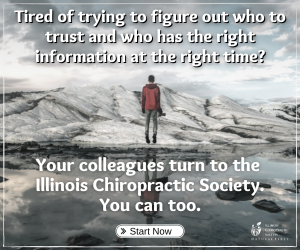
WC Record Requests and Commission Decisions

The following is provided as educational information only, for you and your office. The Illinois Chiropractic Society and Dr. Boileve do not provide legal advice, and this information is not intended as such. Please contact your attorney or patient’s attorney for any legal questions regarding his or her PI/WC case.
Are you one of those clinics that have received a request of records from the Workers’ Comp carrier without a signed HIPAA authorization release from the patient?
- What do you do?
- When do you send records?
- To whom do you send records?
- Confused yet?
Let’s answer this for you.
Section 8(a) of the Illinois Workers’ Compensation Act of 2011states:
Access to Medical Reports
Every hospital, physician, surgeon or other person rendering treatment or services in accordance with the provisions of this Section shall upon written request furnish full and complete reports thereof to, and permit their records to be copied by, the employer, the employee or his dependents, as the case may be, or any other party to any proceeding for compensation before the Commission, or their attorneys.
Basically, this section means if you want to receive payment, then submit any and all records regarding your patient’s workers’ comp injuries.
However, there are many who are concerned regarding HIPAA Privacy Rules that indicate without your patient’s HIPAA authorization to release these records, you will not release any information, let alone records. Doing so may delay if not prevent payment.
The following information is quoted from the U.S. Department of Health and Human Services Office of Civil Rights website. It provides the agency’s interpretation of the HIPAA Privacy Rule regarding submitting documentation to the workers’ comp carrier and its agents, the employer, or their attorneys, without a signed HIPAA authorization release from the patient.
OCR HIPAA Privacy
December 3, 2002 Revised April 3, 2003
DISCLOSURES FOR WORKERS’ COMPENSATION PURPOSES
[45 CFR 164.512(l)]
Background
The HIPAA Privacy Rule does not apply to entities that are either workers’ compensation insurers, workers’ compensation administrative agencies, or employers, except to the extent they may otherwise be covered entities. However, these entities need access to the health information of individuals who are injured on the job or who have a work-related illness to process or adjudicate claims or to coordinate care under workers’ compensation systems. Generally, this health information is obtained from health care providers who treat these individuals and who may be covered by the Privacy Rule. The Privacy Rule recognizes the legitimate need of insurers and other entities involved in the workers’ compensation systems to have access to individuals’ health information as authorized by State or other law. Due to the significant variability among such laws, the Privacy Rule permits disclosures of health information for workers’ compensation purposes in a number of different ways.
How the Rule Works:
Disclosures Without Authorization
Disclosures Without Individual Authorization. The Privacy Rule permits covered entities to disclose protected health information to workers’ compensation insurers, State administrators, employers, and other persons or entities involved in workers’ compensation systems, without the individual’s authorization:
- As authorized by and to the extent necessary to comply with laws relating to workers’ compensation or similar programs established by law that provide benefits for work-related injuries or illness without regard to fault. This includes programs established by the Black Lung Benefits Act, the Federal Employees’ Compensation Act, the Longshore and Harbor Workers’ Compensation Act, and the Energy Employees’ Occupational Illness Compensation Program Act. See 45 CFR 164.512(l).
- To the extent, the disclosure is required by State or other law. The disclosure must comply with and be limited to what the law requires. See 45 CFR 164.512(a).
- For purposes of obtaining payment for any health care provided to the injured or ill worker. See 45 CFR 164.502(a)(1)(ii) and the definition of “payment” at 45 CFR 164.501.
Disclosures With Authorization
Disclosures With Individual Authorization. In addition, covered entities may disclose protected health information to workers’ compensation insurers and others involved in workers’ compensation systems where the individual has provided his or her authorization for the release of the information to the entity. The authorization must contain the elements and otherwise meet the requirements specified at 45 CFR 164.508.
Minimum Necessary. Covered entities are required reasonably to limit the amount of protected health information disclosed under 45 CFR 164.512(l) to the minimum necessary to accomplish the workers’ compensation purpose. Under this requirement, protected health information may be shared for such purposes to the full extent authorized by State or other law.
Covered Entities
In addition, covered entities are required reasonably to limit the amount of protected health information disclosed for payment purposes to the minimum necessary. Covered entities are permitted to disclose the amount and types of protected health information that are necessary to obtain payment for the health care provided to an injured or ill worker.
Where a covered entity routinely makes disclosures for workers’ compensation purposes under 45 CFR 164.512(l) or for payment purposes, the covered entity may develop standard protocols as part of its minimum necessary policies and procedures that address the type and amount of protected health information to be disclosed for such purposes.
Where protected health information is requested by a State workers’ compensation or other public officials, covered entities are permitted to reasonably rely on the official’s representations that the information requested is the minimum necessary for the intended purpose. See 45 CFR 164.514(d)(3)(iii)(A).
Covered entities are not required to make a minimum necessary determination when disclosing protected health information as required by State or other law, or pursuant to the individual’s authorization. See 45 CFR 164.502(b).
The Department will actively monitor the effects of the Privacy Rule, and in particular, the minimum necessary standard, on the workers’ compensation systems and consider proposing modifications, where appropriate, to ensure that the Rule does not have any unintended negative effects that disturb these systems.
* * * * * * * *
HIPAA Protections
In my opinion, reliance on these HIPAA rules may protect you regarding the WC file, but not regarding files that have no relation to the WC injury. In many cases, you may receive a request for previous records of that WC patient without a HIPAA authorization to release records, signed by the patient. Although the Privacy Rule permits you to release records without a signed patient authorization in some circumstances (as outlined above), you should request a signed authorization from the entity that is requesting the records. A subpoena may request “any and all records” for a particular patient, which may be beyond the WC injury. Again, you should request a HIPAA authorization to release records, signed by the patient.
I have contacted numerous attorneys regarding this same subject, and they have agreed that the HIPAA authorization to release records, signed by the patient, is the best protection for the doctor and the patient and therefore should accompany subpoenas for any records not pertaining to the WC injury. The Illinois Chiropractic Society agrees that due to the uncertainty of connection between all patient records and the WC injury, not to mention uncertainty as to the identity of the party requesting records regarding a particular patient, it is preferable for your office to obtain a HIPAA release of records, as signed by the patient, prior to releasing the records(See ICS FAQ regarding responding to subpoenas or court orders for patient records without a signed patient authorization.)
Just remember, not sending the WC records will delay any and all payments for the services rendered. Also, a valid subpoena has the force of law, so you cannot simply ignore it. You should contact the requesting party to explain your objection and request a patient authorization and document your communication.
On another WC issue, have you ever had a patient who was represented by legal counsel, but you have no idea how the case is going at the Commission or results of the settlement if any? Your office has called the attorney but you never receive a return call?
Well, there is great news for all healthcare providers!!!
COMMISSION DECISIONS
As of January 2014, the IWCC has now provided a website that will publish the results of all Commission decisions regarding any and all WC cases. This will include information that cases have settled or have been terminated.
Go to: http://iwcc.il.gov/decisions.htm and on the left side of the screen is IWCC Links. The 8th tab is “CommissionDecisions,” and click here. This is where you will be able to view a list showing each IWCC number with its WC case number, the date the IWCC decision was issued, petitioner, respondent, arbitrator, and panel, click on the month (e.g., January 2014).
Once you arrive at the site, you can view the “Commission Decision” regarding your patient, which will include the award given, if any, or denials.
You must, however, acquire the IC number of the case. This can be requested from the patient’s attorney.
Conclusion
This site is a huge gain for our offices to determine the true amount of the settlement if any, and the amounts that were awarded for medical payments if any.
We at the ICS have long strived to assist its members by providing information on a range of pertinent topics, such as the WC information in this article. If you have any further questions or are not a member, please contact the Illinois Chiropractic Society at (217) 525-1200.
Dr. CM Boileve is a Certified Medical Compliance Specialist and a Certified Insurance Consultant/Reviewer. He also continues to mentor ICS members on Workers’ Compensation and Personal Injury matters. He is available to assist ICS members with their questions and compliance needs.



















